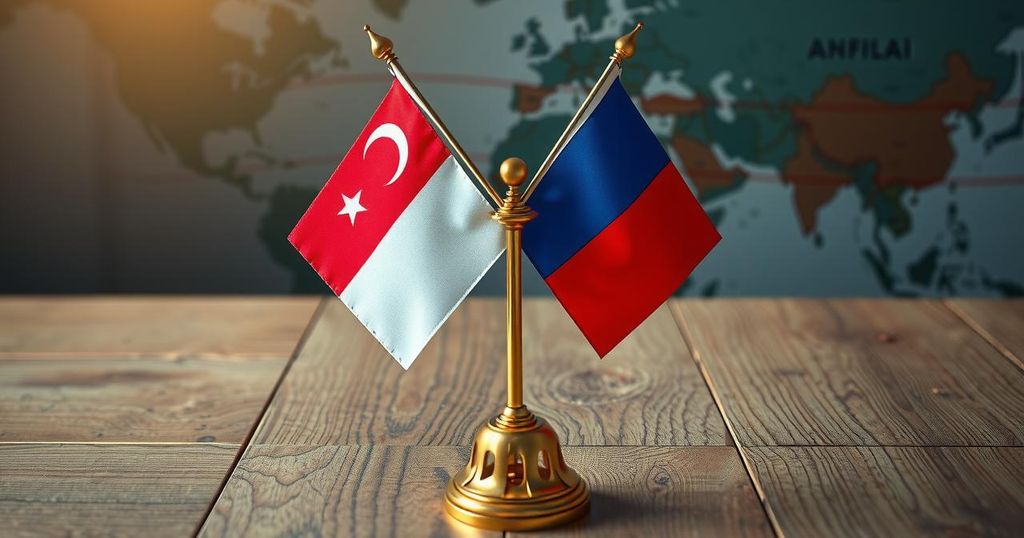Politics
AGRICULTURE, AMAZONIA, BRASILANDIA, BRAZIL, CARAUARI, DISASTER RELIEF, DONALD TRUMP, FERNANDO VERGARA, FOOD SECURITY, INTERNATIONAL AID, JORGE SAENZ, NORTH AMERICA, PERU, SAN RAIMUNDO SETTLEMENT LAKE, SOUTH AMERICA, TRADE, TRUMP, U. S. AGENCY FOR INTERNATIONAL DEVELOPMENT, UNITED STATES, USA, USAID
Clara Montgomery
Impact of USAID’s Dissolution on South America: Consequences for Aid and Conservation
The termination of USAID will disrupt humanitarian, conservation, and drug eradication efforts in South America, particularly impacting vulnerable populations such as Venezuelan migrants and Indigenous communities. The cessation of funding threatens significant projects tied to climate change and social support, raising concerns about the stability and welfare of affected regions.
The disbandment of the U.S. Agency for International Development (USAID) poses significant challenges for humanitarian assistance in Colombia, conservation in the Brazilian Amazon, and coca eradication in Peru. Although some foreign aid may resume after a temporary suspension, many recipients express concerns that this politically charged decision threatens essential projects aimed at climate change, biodiversity, and women’s rights. Colombia has received considerable U.S. support and in 2024, USAID allocated $385 million for various initiatives, including emergency aid for Venezuelan migrants.
The cessation of U.S. humanitarian aid also negatively impacts Venezuelan refugees. Recently, President Trump revoked a temporary immigration status, putting approximately 600,000 Venezuelans at risk of deportation. Experts warn that reductions in aid will exacerbate vulnerabilities for migrant populations susceptible to crime and exploitation by armed groups. In Colombia, President Gustavo Petro criticized USAID, asserting that U.S. funding has begun to pose a threat to national sovereignty.
In Brazil, USAID’s main initiative, aimed at conserving the Amazon, has been crucial for Indigenous communities. The Amazon-based Roraima Indigenous Council, which has relied on U.S. support for seven years, is now forced to lay off workers and halt vital projects due to the funding stoppage. Edinho Macuxi, a leader within the council, emphasized the importance of maintaining partnerships with organizations that protect large portions of the rainforest.
The Amazon region has relied on sustainable practices, like the managed fishing of pirarucu, funded by USAID. Such initiatives not only preserve endangered species but also provide economic benefits to local communities. In 2024, USAID allocated approximately $22.6 million to Brazil, with substantial funding directed towards environmental protection efforts in the Amazon.
For Peru, USAID has historically provided financial assistance aimed at controlling cocaine production through agricultural alternatives. However, with the agency’s withdrawal, Peruvian officials have indicated they will continue these initiatives independently. Critics argue that the absence of USAID could offer Peru an opportunity to reassess ineffective partnerships, as seen in Bolivia, where less U.S. involvement has led to more effective drug control measures.
USAID has long served as a critical source of assistance in South America, contributing to humanitarian efforts, environmental conservation, and drug eradication programs. As the agency faces dissolution, numerous projects that address vital issues such as climate change and community support are now threatened. The cessation of these programs particularly affects vulnerable populations, including Venezuelan migrants and Indigenous communities in the Amazon, raising significant concerns about the impact on regional stability.
In summary, the dismantling of USAID represents a significant retreat from support for critical social, economic, and environmental initiatives in South America. The potential loss of funding puts vulnerable populations at risk and undermines successful programs aimed at combating drug production and protecting vital ecosystems. Stakeholders call for a reevaluation of thesefunding decisions to avoid exacerbating existing challenges faced by marginalized communities.
Original Source: apnews.com








Post Comment